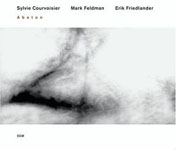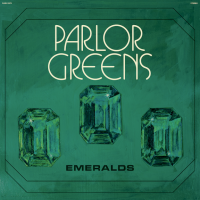Home » Jazz Articles » Interview » Mark Feldman: His Own Music, His Own Sound, His Own Aesthetic
Mark Feldman: His Own Music, His Own Sound, His Own Aesthetic
MF: Then it's back to practicing. I guess someday I'm going to find more of a connection between practicing and playing. Then maybe things will work out even better—I don't know.
AAJ: Speaking of Masada Recital—that pulls us into talking more about John Zorn, with whom you've collaborated in a variety of settings. He's obviously a pretty looming musical figure. These groups you've played in like Masada Recital, Masada String Trio or Bar Kokhba Sextet approach his music as interpreters of his compositions, which are somewhat flexible forms. Sometimes, he's actually conducting the groups. It's interesting to hear a song like "Abidan performed by the String Trio as opposed to Masada Recital. What attracts you to his pieces and what do you think they bring out of you as a musician?
MF: Basically, he demands a really high standard of exactness, and so [laughing] I'm just trying to get there and do it. What it brings out of me, I don't know. I know that after working with him, my ideas about clarity and precision became much more clear and precise. I really see his mind—he's so clear. And that's really what's so great about his music. It's so clear. The intent of his music is so clear. So as a performer, I think you're just trying to perform on a level where you're not screwing up enough to get in the way of that.
And I don't mean that his music is precise in the sense of it being just technical. It's precise in its intent. It's never like, "What's he going after here? You never say, "You know, I was with him up to this point, and then I didn't know what he was going for. You like it or you don't like it, but it's really clear what he's saying. From the beginning to the end and that's true of everything he does, from his string quartets to his tone-poem pieces like "Duras and down to the Masada tunes. It's all really clear. Which sounds simple, like, okay, "Just be clear. But when you really see it demonstrated to you—it made a big impression on me. AAJ: This has nothing with what you do now, but I'm interested in your pre-New-York, 1980s career as a Nashville player. I know you did a lot of touring and recording with country guys like Willie Nelson, Ray Price, George Jones and Jerry Lee Lewis.
AAJ: This has nothing with what you do now, but I'm interested in your pre-New-York, 1980s career as a Nashville player. I know you did a lot of touring and recording with country guys like Willie Nelson, Ray Price, George Jones and Jerry Lee Lewis.
MF: Well, with some of those guys, it was recording, and with some it was touring. I toured with Loretta Lynn for a year on the bus. That was 120 concerts in 365 days, plus the travel days. We were on the kind of bus with the bunks—you don't see them so much in New York. You get out into South Jersey, and you'll see them. Those kinds of big buses where it'll say "Conway Twitty on the side.
AAJ: Well, tell me what it was like touring with Loretta.
MF: Well, it was funny. Her son was in the band. I sort of chopped up the players in Loretta's band into two categories: lifers and non-lifers. Lifers were people who were definitely going to be there for the long haul. Then there were people like me, who were just sort of there out of a kind of happenstance. They didn't want to do this their whole life. And I remember the first day I was on the job. Her son and I went into the men's room, and he turned around to me while standing at a urinal and said, "This is where we pee. I forget his name.
AAJ: It was nice of him to take you under his wing.
MF: Well, I felt like he was trying to tell me, "I know you're not one of us. You're here from Time Magazine or something. It was just spooky when he said that. And the road manager was a member of the American Nazi Party. But her business manager was Jewish, so it all really ran the gamut. I felt like it was a combination of being in the army and being a truck driver, except that instead of carrying a gun or driving a truck, I had a violin. It was army-like in the pecking order and seniority vibe about it, and also in the scheduling. And it was truck-driver-like in that every seven hours, I was eating in a truck stop—and I felt like I had the right to use the booths that said, "For Professional Drivers Only. I had kind of earned that status.
So it was really a truck-driving, army-like experience, and I saw so much of the country, which was really great. I played a place in Georgia that still had a dirt floor; it was this open-air place with a roof and these old kinds of electric fans. And a dirt floor. I played a place in Louisiana that had a tree growing in the middle of the dance floor. All these things I would never have seen. I feel like I definitely learned about America and since I came from Chicago and later moved to New York, I ended with a whole viewpoint about Americans that's much broader than if I had stayed in Chicago or New York.
AAJ: How were the country bands you played in musically?
MF: The two bands I was in—the Loretta and the Ray Price bands—were great. They were great bands doing what they did. They were really excellent. The other stuff I did was mostly studio stuff. Some people have gotten something wrong about me: I was never a country fiddler. I was a commercial violinist who could adapt like hell. So if I got a call to go on the road with Ray Price, if I got a record of their show or their recordings, I could play exactly what the last guy played. Probably in twelve hours' time.
I remember when I went out with Ray and had to play lead, I got all this oversized music paper and made cheat sheets and put them on the floor at my feet. No one could see them. I would just try to play what the last guy played. But I was never a guy who could, say, go to a bluegrass jam session. And with Loretta Lynn, I was playing second fiddle to a guy named Buddy Spiker, so he'd give me all the parts to play. He'd just dictate them to me. I met Buddy Spiker in Chicago at the Old Town School of Folk Music, and that's how I ended up going down there. I was living in Chicago in New Town—Belmont and Broadway—in the late seventies. I was playing in the Civic Orchestra of Chicago, which was the training group for the symphony. That was probably my most formal education. And then I was playing in all these Chicago bar bands, back when Chicago had music in every bar. You're from Chicago—do you remember?
AAJ: Yes. MF: So I had jobs in all these bars, at least from Thursday through Saturday. Some of them didn't even have a stage; you just set up where the jukebox was. So I played with all these groups—rockabilly, early rock n' roll, country, western swing. There was tons of work. Every bar had a sign that said, "Old Style.
MF: So I had jobs in all these bars, at least from Thursday through Saturday. Some of them didn't even have a stage; you just set up where the jukebox was. So I played with all these groups—rockabilly, early rock n' roll, country, western swing. There was tons of work. Every bar had a sign that said, "Old Style.
AAJ: The beer? Well, they still have that.
MF: So that hasn't changed. And underneath the words "Old Style was the name of the bar. Now, it wasn't always the highest culture you ever heard, but it was live music. I used to work all the joints on Lincoln Avenue, and after that I worked with this country swing band called the Jump 'n the Saddle Band. They had that hit—"The Curley Shuffle. Then I played with another one with a great name: the Flatland Bar Stars. They were the band that used to work all these places without a stage. It was a whole different life. I was 23 or so, and I'd end up being roommates with some band's guitarist, just moving from one place to another. I think my rent was under fifty bucks a month.
AAJ: Tell me what you'll be doing in 2007.
MF: Well, starting in February, I have a tour with Sylvie, followed by a tour with Abercrombie. I'm in a bit of a period of transition. I have little jobs, but in terms of my own thing, I dropped a lot of the sideman work I was doing. There was a period where I was working with Dave Douglas, Uri Caine, Zorn and Abercrombie—all at the same time. Plus one-offs. So I needed a change, and I'm not as busy now, because I'm trying to do my own things.
Selected Discography
Mark Feldman, What Exit (ECM, 2006)
Mark Feldman/Sylvie Courvoisier, Malphas: Book of Angels, Volume 3 (Tzadik, 2006)
Bar Kokhba Sextet, 50th Birthday Celebration, Volume 11 (Tzadik, 2006)
Masada String Trio, Azazel: Book of Angels, Volume 2 (Tzadik, 2005)
Masada Recital, Masada Anniversary Edition, Volume 4 (Tzadik, 2005)
John Abercrombie, Class Trip (ECM, 2004)
Sylvie Courvoisier, Abaton (ECM, 2003)
Marc Ribot, Filmworks 2 (Tzadik, 2003)
John Zorn, Cobra (Tzadik, 2002)
John Abercrombie, Cat 'n' Mouse (ECM, 2002)
John Zorn, Filmworks XI: Under the Wing (Tzadik, 2002)
Raz Mesinai, Before the Law (Tzadik, 2001)
Dave Douglas, Witness (Bluebird/BMG, 2001)
Muhal Richard Abrams, The Visibility of Thought (Mutable Music, 2001)
Dave Douglas, A Thousand Evenings (BMG/RCA Victor, 2000)
John Abercrombie, Open Land (ECM, 1999)
Mark Feldman/Sylvie Courvoisier, Music For Piano and Violin (Avant, 1999) Wolfgang Puschnig/Mark Feldman, Spaces (Emarcy, 1999)
Dave Douglas, Convergence (Soul Note, 1998)
John Zorn, The Circle Maker (Tzadik, 1998)
Mark Helias, Fictionary (GM, 1998)
Billy Hart, Oceans of Time (Arabesque, 1997)
Mark Dresser, Banquet (Tzadik, 1997)
Trilok Gurtu, Bad Habits Die Hard (CMP, 1996)
Arcado String Trio, Live in Europe (Avant, 1996) Mark Feldman, Music For Violin Alone (Tzadik, 1995)
New & Used, Consensus (Knitting Factory, 1995)
Michael Jefry Stevens/Mark Feldman, Haiku (Leo, 1995)
Marilyn Crispell, Santuerio (Leo, 1994)
Arcado, For Three Strings and Orchestra (JMT, 1992)
Tim Berne, Fractured Fairy Tales (JMT, 1989)
Photo Credits
Top Photo: Valerie Trucchia, courtesy of ECM Records
Second Photo: Christopher Tribble, courtesy of ECM Records
Third Photo: Nunzio Mari
Bottom Photo: Valerie Trucchia, courtesy of ECM Records
Tags
PREVIOUS / NEXT
Support All About Jazz
 All About Jazz has been a pillar of jazz since 1995, championing it as an art form and, more importantly, supporting the musicians who make it. Our enduring commitment has made "AAJ" one of the most culturally important websites of its kind, read by hundreds of thousands of fans, musicians and industry figures every month.
All About Jazz has been a pillar of jazz since 1995, championing it as an art form and, more importantly, supporting the musicians who make it. Our enduring commitment has made "AAJ" one of the most culturally important websites of its kind, read by hundreds of thousands of fans, musicians and industry figures every month.
























